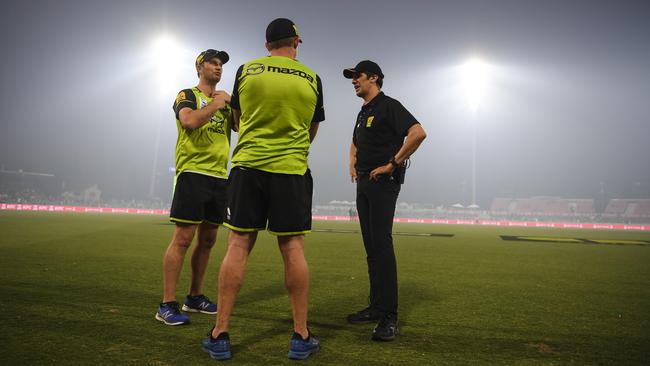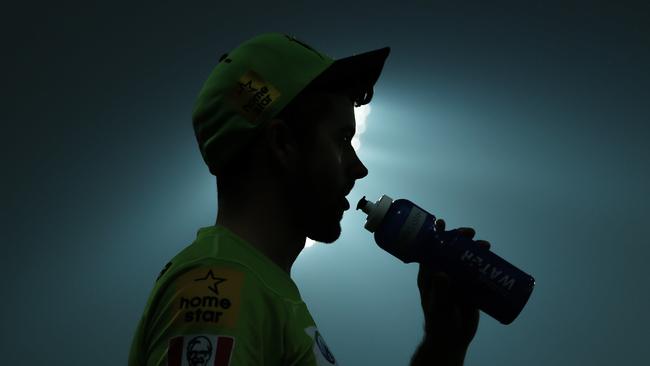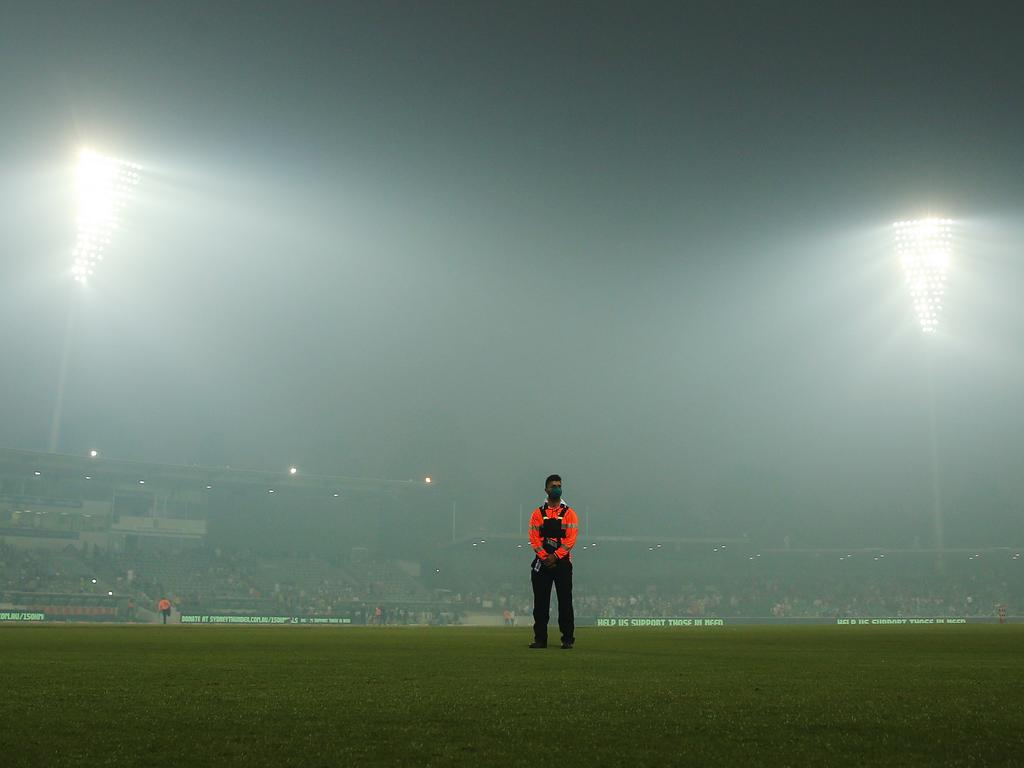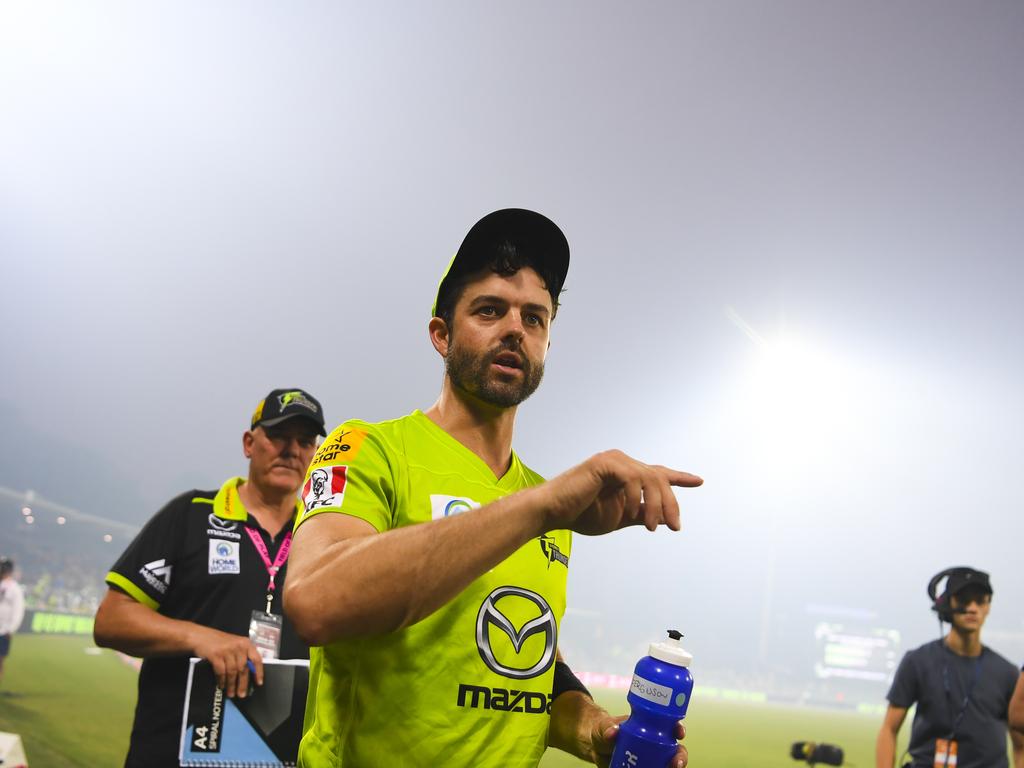Australia v New Zealand: Cricket’s rain rules fired up for SCG Test
Bushfire smoke will be treated in the same manner as a rain by Cricket Australia as the organisation prepares itself for the worst at the Sydney Test.

Bushfire smoke will be treated in the same manner as rain by Cricket Australia as the organisation prepares itself for the worst ahead of the Sydney Test.
The NSW Blues, Breakers and four BBL sides have all been forced to move training indoors during the past month because of air quality in the city.
A second XI game was forced to delay its start last month because medical staff were concerned for the health of players. Air quality in Sydney has been rated “hazardous” on 28 days since the start of November and a Big Bash League match in Canberra was abandoned on Saturday because visibility was so poor.
Some players reported the ill effects of smoke that night while others involved in a Sheffield Shield game at the SCG two weeks ago said they too had felt ill in the following days.
Cricket Australia medical staff say that oxygen intake increases by at least 20 per cent during exercise, possibly more, as athletes tend to breathe through their mouth and not the nose.
Chief Medical Officer for CA and Cricket NSW, Dr John Orchard, said the bushfire crisis has forced them to respond on the run.
“We’ve developed a lot of policies over the years on concussion, heat, pregnancy, cardiac screening and the like and we’ve done it by analysing the science, preparing draft papers and consulting widely but this one has blindsided us,” Orchard said. “We prefer to develop policy over time but we had to move fast.”
The A-League is also working to draft a policy due to the impact of the pollution on footballers in different areas.
CA has pulled together guidelines for all domestic cricket based on recommendations from the International Cricket Council and the Australian Institute of Sport while searching for a satisfactory way to get real-time air quality readings at grounds.
Publicly available pollution readings are often 24 hour averages or hourly updates and not available for specific locations. The index did not change when thick smoke rolled over the match at Manuka Oval on Saturday night but the game was abandoned because umpires were concerned about visibility.

Two years ago a Test match in Delhi between India and Sri Lanka was suspended three times when the air quality became too bad to continue. Sri Lankan players were vomiting and players on both sides wore face masks while oxygen tanks were placed in dressing rooms.
The acting head of the Indian cricket board condemned the visiting side for making a fuss when spectators seemed unaffected.
CA head of operations Peter Roach said ICC guidelines — which were developed after the Delhi match — would apply in Sydney.
Under the guidelines used in domestic cricket doctors can suspend or call off a match if players’ health is affected while umpires can do the same if visibility is an issue.
The ICC says match officials should “consider the need to delay the start of play, call for an extended break in play or suspend play for the day” if the air quality index is close to 300 or more for an extended period. Sydney has, according to reports, had 28 such days in the past seven weeks.
“It’s a growing issue that we’re seeing around the country, certainly Sydney and Canberra mainly,” Roach said.
“Like rain, the rules are in place to add time, to suspend play.
“But what we’re finding is it comes in quick but also goes quick. It’s unlikely we believe it’ll be there for a full day.
“We might see some challenges across that day, but we’ll play it like rain or adverse weather. Time can be added on.
“We’ve got a lot of data from the weather bureaus to say when things get dangerous, but what we’re seeing is the visibility seems to be the most obvious thing.
“I think we have concern when the smoke’s around, definitely, because it is a challenge on those two metrics.”
Test bowler Peter Siddle bowled two overs before the Canberra match was abandoned and played down the impact on his health.
“There’s bigger issues going on than worrying about a cricket game,’’ Siddle said.





To join the conversation, please log in. Don't have an account? Register
Join the conversation, you are commenting as Logout